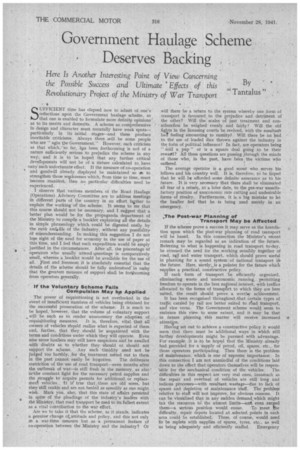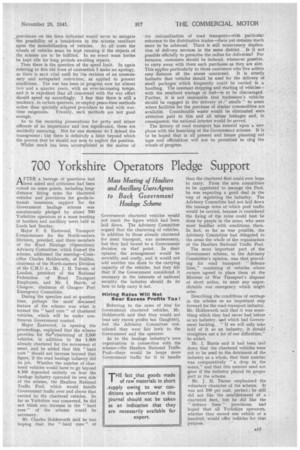Government Haulage Scheme Deserves Backing ,
Page 32

Page 35

If you've noticed an error in this article please click here to report it so we can fix it.
By "Tantalus "
SUFFICIENT time has elapsed now to admit of one's reflections upon the Government haulage scheme, so that one is enabled to formulate more definite opinions " as to its merits and demerits. A scheme so comprehensive in design and character must naturally have weak spots— particularly in its initial stages—and these produce inevitable criticisms. Always there will be some people who are " agin the Government." However, such criticism as that which,-so far, hp been forthcoming is not of a nature sufficiently serious to prejudice the scheme in any way, and it is to be hoped that any further critical deveTopments will not be of -a nature calculated to,. have
.any such unfortunate effect. If the measure of co-operation
' and goodwill already displayed be maintained so as to strengthen those weelmesses which, from time to time, must become manifest, then no particular difficulties need be experienced.
I observe that various members of the Road Haulage (Operations) . Advisory Committee are to address meetings in different parts of the country in an effort fujther to explain the working 'of the scheme. It seems to me that this course should not be necessary, and I suggest that a better plan would be for the propaganda department of the Ministry to compile a booklet explaining all the details, in simple phraseology which could be digested easily by the rank anda file of the industry, without any possibility of misunderstanding. In making this suggestion I do not lose sight of the need for economy in the use of paper at this time, and I feel that such expenditure would be amply
9 . justified in the circumstances. After all, the precentage of operators who usually attend vneetings is comparatively small, whereas a booklet would be available for the use of all. first and foremost it is absolutely essential that the details of the scheme should be fully understood' in =ley that the greatest measure of support shall be forthcoming from operators generally.
' If the Voluntary Scheme Falls Compulsion May Iv) Applied .
The power of requisitioning is not overlooked in the event of insufficient numbers of vehicles being obtained for the successful prosecution of the scheme. It is much to be hoped, however, that the volume of voluntary support will be such as to render unnecessary the adoption of requisitioning measures. -It is, therefore, vital that all owners of vehicles shquld realize what is expected of them and, further, that they should be acquainted with the terms and conditions under which they will operate. Even now some hauliers may still. have suspicions and be assailed with doubts as to whether they 'should or. should not support the scheme. Any such timidity need not be judged too harshly, .for the, treatment meted out to them in the past cannot easily he forgotten. The deliberate restriction of the use of road transport—even months after the outbreak of war—is still fresh in the memory, as also' is -the constant fight for the necessary petrol supplies and the struggle to acquire permits for additional or replacement vehicles. it is' true' that;, these are old sores, but they still rankle and are not healed as speedily as one might wish. Mark you, also, that this state of affairs persisted in spite of the pleadings of the industry's leaders with the Ministry, that road transport be used to its fullest extent as a vital cotrtribution to the war effort.
Are we to take it that the scheme, as it stands, indicates a genuine change otattitude and policy, and this not only es a war-time measure but as 'a permanent feature of co-operation between the Ministry and the industry? Or will there be a return to the system whereby one .form of transport is favoured to the prejudice and detriment of the other? Will the' scales of just treatment and consideration be weighed evenly and fairly? Will . the old fights in the licensing courts be revived, with the resultant bad feeling amounting to enmity? Will there be an 'end to the use of loaded dice thrown against the industry in the form of political influence? In fact, are operators being "
sold a pup" or is a square deal going to be their rewattl? All these questions are passing ,through the minds of those who, in the past, have been the victims who suffered, The average operator is a good scout who serves his fellows and his country well. It is, therefore, to he hoped that he will be afforded some definite assurance as to his future. It is very necessary that there shall be eliminated all fear of a return, at a later date, to the pre-war unsatisfactory position of uneconomic rate cutting and undesirable forms of rivalry. Furthermore, it is a big mistake to let the haulier feel that he is being used merely in an emergency.
,The Post-war Planning of Transport May be Affected If the scheme prove a success it may serve as the foundation upon which the pbst-war planning of road tsansport
will be based. In this connection the Minister's recent remark may be regarded as an indication of the future. Referring to what is happening in road transport to-day, he stressed the need for the working sensibly together of road, rail and water transport, which should prove useful in planning for a sound system of national transport the future. Here, siirely„is a pointer for the future whieh supplies a practical, constructive policy.
If each form of transport be efficiently organized, eliminating waste and uneconomic, running, permitting freedom to operate in the best national interest, with 'traffics allocated to the forms of transport to which they are best suited, the result should prove a worthy achievement.
It has been recognized throughout /that certain types of traffic carried by rail are better suited to rtad transport, and vice versa. The Government scheme would seem to embrace this view to some extent, and it may be that in future planning this matter will receive increased, a attent‘on.
Having set out to achieve a constructive policy it would seem that there must be additional ways in which still further developments might be pursued with advantage. For example, it is .to be hoped that the Ministry already had provided for a 'supply of petrol, oil, spares, etc., for those operators participating. Then there is the problem of maintenance, which is one of supreme importance. In this connection I am not unmindful of the conditions laid down to the effect that operators themselves will be respon *sible for the mechanical condition of the vehicles. The difficulties in this respect are very real ones, inasmuch as the repair and overhaul of vehicles are still' long and tedious processes—with resultant wastage—due to lack of spares and depletion of maintenance 'staff. The problem relative to staff will not improve, for obvious reasons. it can be visualized that in any sudden demand,,which might tax the resources 14 the utmost limits—and even exceed
them—a serious position would ensue. To 'neet Ihe difficulty, repair depots located at selected points in each area could be established. These, of course, would need to be replete with supplies of spares, tyres, etc., as well
as being adequately and efficiently staffed. Emergency provisions on the lines indicated would serve to mitigate the possibility of a breakdown in the scheme resultant upon the immobilization of vehicles. At all costs the wheels of vehicles must be kept running if the objects of the scheme are to be fulfilled. In no event must lorries he kept idle for long periods awaiting repairs.
Then there is the question of the speed limit. In again referring to this old bone of contention I make no apology, as there is such vital need for the revision of an unnecessary and antiquated restriction; as applied to present Conditions. The war has been in progress now for almost two and a quarter years, with an ever-increasing tempo, and it is expedient that all concerned with the war effort should speed up accordingly. I fear that there is still a tendency, in certain quarters, to employ peace-time methods rather than specially adapted procedure to deal with war time exigencies. Frankly, such methods are not good enough.
As to the recurring prosecutions for petty and minor offences of no importance and less significance, these are decidedly annoying. Not for one moment do I defend the transgressor ; but there is definitAy a limit beyond which the powers that be should not seek to exploit the position.
Whilst much has been accomplished in the matter of the rationalization of road transport—with particular reference to the distributive trades—there yet remains much more to be achieved. There is still unnecessary duplication of delivery services in the same district. Is it not possible officially to prescribe the radius for deliveries? For instance, customers should be induced, whenever possible, to carry away with them such purchases as they are able. This applies particularly to those customers who live within easy distance of thestores concerned. It is utterly fantastic that vehicles should be used for the delivery of small packages which frequently could be carried in a handbag. The constant stopping and starting of vehicles— with the resultant wastage of fuel—is to be discouraged. Further, it is not reasonable that tradesmen's vehicles should be engaged in the delivery of .." smalls " to areas where facilities for the purchase of similar commodities are available. Considerable waste would be eliminated were attention paid to this and all minor leakages and, in consequence, the national interest would be served. The history of road transport has entered upon a new phase with the launching of the Government scheme. It is to be hoped that in all present and future planning red tape and officialdom will not be permitted to clog the wheels of progress.




















































